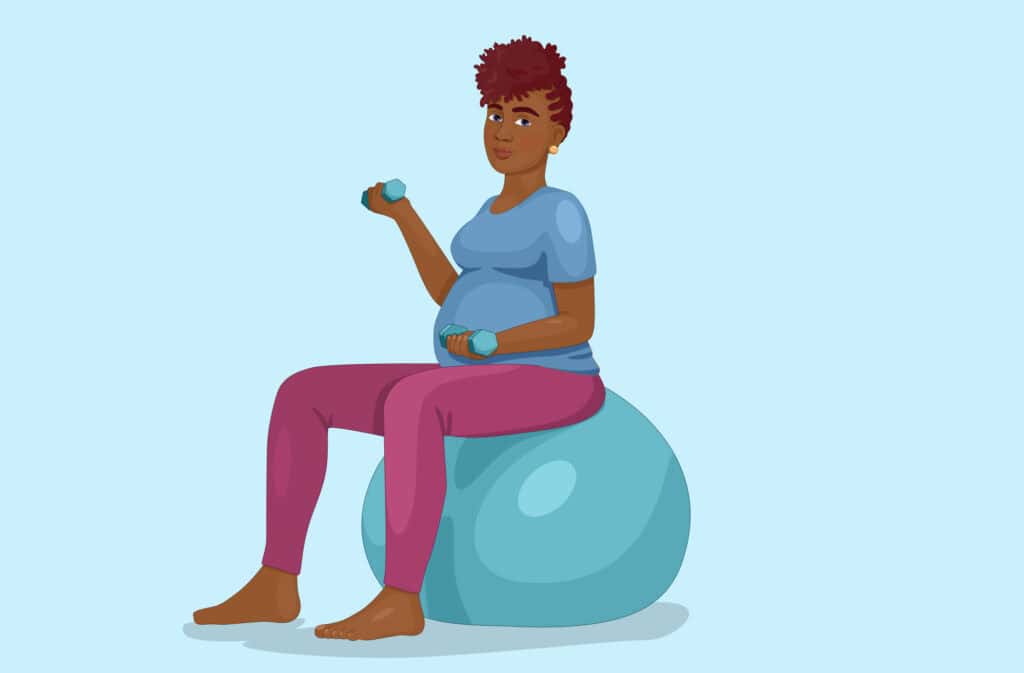Femia > Pregnancy Weight Gain Calculator
Pregnancy weight gain calculator
The Pregnancy weight gain calculator estimates a schedule for healthy weight gain based on guidelines from the Institute of Medicine


Femia app helps you stay on track, stress-free!
Femia helps you stay on track, stress-free!
| Week | Recommended Weight Range | Recommended Weight Gain |
|---|

Created with Natallia Yermolovich, Obstetrician-gynecologist
- Updated February 25, 2025
- Published
Pregnancy weight gain calculator
A pregnancy weight gain calculator is designed to help expectant mothers understand and monitor their weight gain during pregnancy. By entering your information, the calculator can indicate whether your weight gain is within the recommended range.
Gaining weight is a normal and healthy part of pregnancy, supporting your baby’s growth and development. It’s also common to experience weird pregnancy cravings that can influence your eating habits. Maintaining a balanced pregnancy diet is important to ensure you and your baby receive all necessary nutrients. If your weight gain exceeds the recommended range, you may benefit from consulting a healthcare provider or dietitian to develop a balanced eating plan that includes all the essential nutrients for you and your baby.
Using a pregnant weight gain calculator is a good idea for all pregnant ladies. This simple tool takes the guesswork out of the equation and provides personalized advice for recommended weight gain at each stage of your pregnancy journey.
How to use the pregnancy weight calculator
A weight gain during pregnancy calculator is an intuitive, easy-to-use tool designed to support you during your pregnancy. Here the information you’ll need to include to get the most out of it:
- Preferred measurement system. Make sure the weight gain pregnancy calculator is set to your preferred units: US units or metric units.
- Height and pre-pregnancy weight. This data is used to calculate your pre-pregnancy BMI. Your pre-pregnancy BMI is used to sort your pre-pregnancy weight into one of the following categories: underweight, normal, overweight, or obese. The amount of weight that is healthy for you to gain while pregnant is determined by your pre-pregnancy weight category.
- Current weight. Knowing your current weight will allow you to calculate exactly how much you’ve gained from your pre-pregnancy weight.
- Week of pregnancy. The calculator compares your current weight to a healthy range for the particular week of pregnancy.
- Indicate whether you are carrying twins or multiples. You should gain more weight if you are having more than one baby.

Pregnancy weight gain calculator: How to interpret the results?
Then, click “calculate.” In a quick second, the pregnancy weight tracker will let you know a bunch of useful information:
- The recommended weight range for the week of pregnancy you selected – This range helps you understand typical weight expectations for this stage in your pregnancy.
- How your current weight fits within that range – For example, your current weight might be slightly above or below the recommended range, providing a general idea of how you’re tracking and whether any adjustments might be needed. This insight can help you and your healthcare provider determine if you should maintain your current eating and exercise habits or make changes to better support your health and your baby’s development.
- Recommended weight range when delivering (40th week) – This estimate shows the healthy target range for your full-term weight gain.
- Your BMI before pregnancy – Understanding your pre-pregnancy BMI is important because it helps personalize weight gain recommendations. This information enables your healthcare provider to tailor advice specifically to your individual needs, supporting you throughout your unique pregnancy journey.
How much weight should you gain during pregnancy?
Typically, pregnant women gain between 10 kg and 12.5 kg (22 lb to 28 lb) over the course of their pregnancy. Weight gain tends to be gradual, often starting in the first trimester and accelerating during the second and third trimesters. While it’s common for more weight to be gained after the 20th week, this increase is part of a continuous progression rather than a sudden jump. Individual experiences can vary—some women may gain less weight in the first trimester due to nausea or changes in appetite.
However, the recommended amount of weight you should aim to gain depends on several factors, including your pre-pregnancy BMI, the number of babies you’re carrying, and any health conditions that may influence what’s safe or necessary. For example, individuals with a lower BMI before pregnancy might be encouraged to gain more weight to support their baby’s development, while those with a higher BMI may be advised to gain less to minimize potential health risks.
Pregnancy BMI and number of babies: How much weight should you gain?
A pregnancy BMI, or pre-pregnancy BMI, is calculated in a similar way as a normal BMI. It is the ratio of height to weight used to estimate the amount of body fat. However, the pregnancy BMI calculator uses your pre-pregnancy weight instead of your current weight.
Why is pregnancy BMI so important? Pregnancy requires a lot of energy: for developing your baby, the delivery, and breastfeeding. Your body will likely need extra energy, which is stored as fat and reflected in the BMI.
Here’s an overview of the recommended weight gain based on pre-pregnancy BMI suggested by the U.S. Institute of Medicine (IOM):
| Pre-pregnancy BMI | Category | Recommended total weight gain | Recommended weight gain in twin pregnancies |
|---|---|---|---|
| Under 18.5 | Underweight | 28–40 lb | – |
| Between 18.5 and 24.9 | Normal | 25–35 lb | 37–54 lb |
| Between 25 and 29.9 | Overweight | 15–25 lb | 31–50 lb |
| 30 and greater | Obese | 11–20 lb | 25–42 lb |
Simply put, if you were overweight or obese before pregnancy, you might have to watch your calorie intake. If you were underweight, you might need to gain more weight than somebody whose pre-pregnancy weight was normal.
The weight gain is not constant throughout pregnancy. It typically progresses at different rates in each semester:
- During the first trimester (weeks 1–12), weight gain can vary between 1 and 4.5 pounds. Some ladies feel like the pounds just keep adding, while others gain little to no weight. This is because some women struggle with morning sickness and reduced appetite, while others get very hormonal and eat much more than usual. Both are fine!
- During the second trimester (weeks 13–26), weight gain usually increases, and your baby starts to grow more rapidly. You might expect to gain about 1 to 2 pounds per week.
- During the third trimester (weeks 27–40), weight gain usually continues at around 1 to 2 pounds per week. You may experience a slower rate of weight gain closer to delivery or continue to gain weight steadily.

Where are the extra pounds stored?
Pregnancy weight gain doesn’t solely mean fat! Here is how the weight is typically distributed during pregnancy:
| Baby weight | 7–8 lb (about 3–3.6 kg) | ||||||||||
| Placenta | 1.5 lb (about 0.7 kg) | ||||||||||
| Amniotic fluid | 2 lb (about 0.9 kg) | ||||||||||
| Larger uterus | 2 lb (about 0.5–1.4 kg) | ||||||||||
| Larger breasts | 1-3 lb (about 0.5–1.4 kg) | ||||||||||
| Increased fluid volume | 2–3 lb (about 0.9–1.4 kg) | ||||||||||
| Increased blood volume | 3–4 lb (about 1.4–1.8 kg) | ||||||||||
| Fat stores | 6–8 lb (about 2.7–3.6 kg) | ||||||||||
Factors influencing weight gain during pregnancy
Remember that every pregnancy is unique. You might gain more or less than your friend of a similar constitution—which is totally fine, as long as you fall within the healthy range.
Several factors can influence your weight gain during pregnancy. Here are some of them:
- Genetics. How much weight did your mom gain while pregnant? Genetics can impact how weight is distributed and the rate at which it is gained. Moreover, your metabolic rate can be largely affected by genetics. Your metabolism determines how efficiently the body processes food and stores fat, which plays a role in overall weight gain.
- Your diet. Your caloric intake and the quality of the food you eat are crucial during pregnancy. Depending on your pre-pregnancy BMI and activity level, you may need to adjust your calorie consumption. Generally, increasing your intake by about 300 calories per day during the second and third trimesters is recommended. Focus on nutrient-dense foods rich in essential vitamins and minerals.
- Physical activity and exercise. Regular, moderate exercise, such as walking, swimming, or prenatal yoga, can help control the number of pounds you add each month. If you stick to a more sedentary lifestyle, the weight gain might also be more rapid. Always consult your healthcare provider before making any significant changes to your diet or exercise routine.
- Pre-existing health conditions. Certain medical concerns, especially ones that meddle with your metabolism, like diabetes or thyroid issues, can make you gain more weight during pregnancy.
- Emotional and psychological factors. Have you been feeling stressed and anxious? Are you having mood swings? All of these issues, which might date from before pregnancy or arise as pregnancy progresses, might lead to stress eating, emotional eating, or a loss of appetite.
Potential complications of suboptimal weight gain
We’ve talked a lot about tracking your weight gain and making sure you are within the recommended ranges. But, what complications may arise if you fail to do so?
Excessive weight gain may increase your risk of:
- High blood pressure during pregnancy, also known as preeclampsia. Preeclampsia is a potentially life-threatening condition during pregnancy that involves more than just spikes in blood pressure. It is characterized by elevated blood pressure accompanied by other serious symptoms such as protein in the urine (proteinuria), swelling of the hands, feet, face, and abdomen (edema), and dysfunction of certain organs like the liver and kidneys. Preeclampsia can lead to significant health concerns for both you and your baby, so early detection and management are crucial.
- Gestational diabetes. Gestational diabetes is a type of diabetes that develops during pregnancy when your blood sugar levels become higher than normal. This can lead to your baby growing larger than average—a condition known as macrosomia—which can complicate delivery. Additionally, gestational diabetes may increase the risk of your child developing health issues later in life, such as obesity and type 2 diabetes.
On the other hand, not gaining enough weight might lead to:
- Lower birth weight. This puts your baby at a higher risk for infection, developmental delays, and long-term conditions, like diabetes and heart disease. Babies with low birth weight (less than 5.5 pounds or 2.5 kg) are also more vulnerable to complications after birth, such as breathing and feeding difficulties.
- Increased chance of premature birth. A premature birth refers to delivery before 37 weeks of pregnancy. For your baby, this might mean a higher risk for respiratory issues, feeding difficulties, infections, and developmental delays. They may also need extended time in neonatal intensive care and may face long-term health challenges.
Your trusted healthcare provider can help you understand what’s right for you and your baby. Regular check-ups are a great way to stay on track and address any concerns you might have about your weight gain.
How does weight gain during pregnancy affect labor and delivery?
Weight gain during pregnancy not only impacts your health and your baby’s development but can also lead to complications during labor and delivery. Maintaining a healthy weight gain can reduce the risk of these complications, promoting a safer delivery for both you and your baby. Staying within the recommended weight range helps ensure that labor progresses smoothly and decreases the likelihood of issues such as prolonged labor or the need for surgical interventions.
Excessive weight gain
Gaining too much weight may increase the risk of Cesarean delivery, as the baby is likely to grow too large for vaginal delivery. In some cases, a large baby’s shoulder gets stuck while passing through the birth canal, which is known as shoulder dystocia.
If labor gets very long and physically demanding, your doctor might have to use forceps or vacuum extraction to aid delivery. These medical interventions come with risks for your health and that of your baby. Moreover, excessive weight gain might carry a higher chance of postpartum bleeding, infections, and overall longer recovery time.
Insufficient weight gain
As we already mentioned, your baby might arrive preterm and have a lower birth weight if you don’t gain enough weight during pregnancy.
Moreover, insufficient weight gain might also cause restricted blood flow and nutrient supply to the placenta. This can lead to placental complications that make a safe delivery more challenging.
Questions from the Femia community
Can I lose weight safely during pregnancy?
Minor weight loss might happen naturally; however, losing weight on purpose while pregnant is generally not recommended unless advised by a healthcare provider for specific medical reasons. It is important to focus on healthy weight gain and maintaining a balanced diet.
What if I have a multiple pregnancy, like twins or triplets?
Typically, women pregnant with multiples need to put on more gestational weight to ensure the optimal growth of all babies. The total amount of recommended weight gain depends on multiple factors, including the number of fetuses and individual health. If you’re carrying multiples, it’s recommended to seek personalized advice from your healthcare provider.
How can I manage weight gain if I have gestational diabetes?
Mothers-to-be with gestational diabetes typically need to closely track their blood sugar levels and follow a well-balanced diet plan to ensure healthy weight gain. You might also be advised to incorporate regular physical activity based on a healthcare provider’s recommendations.
Is it normal to gain weight rapidly at certain points during pregnancy?
Rapid weight gain can occur naturally due to the baby’s growth and increase in bodily fluid levels. This mostly takes place in the second and third trimesters. However, significant or sudden changes in weight should be discussed with your healthcare provider to rule out potential issues.
The bottom line
Pregnancy weight gain is a natural process that tends to be unique to every expectant mother and determined by a range of individual factors. However, general guidelines for healthy weight gain do exist. Gaining too much or too little weight may cause serious complications for you and your baby.
Therefore, don’t hesitate to use the available tools, and seek personalized medical advice to ensure optimal health for both you and your baby. Using a pregnant weight gain calculator is an easy way to closely monitor your BMI throughout the entire pregnancy and ensure it remains within the healthy range.
References
- “Pregnancy: Learn More – Weight Gain in Pregnancy.” InformedHealth.Org [Internet], Institute for Quality and Efficiency in Health Care (IQWiG), 2022. www.ncbi.nlm.nih.gov, https://www.ncbi.nlm.nih.gov/books/NBK279575/.
- “Pregnancy Weight Gain Chart.” American Pregnancy Association, 27 Apr. 2020, https://americanpregnancy.org/healthy-pregnancy/pregnancy-health-wellness/pregnancy-weight-gain/.
- Rasmussen, Kathleen M., et al. “Determinants of Gestational Weight Gain.” Weight Gain During Pregnancy: Reexamining the Guidelines, National Academies Press (US), 2009. www.ncbi.nlm.nih.gov, https://www.ncbi.nlm.nih.gov/books/NBK32811/.
- “Weight Gain During Pregnancy.” Maternal Infant Health, 20 May 2024, https://www.cdc.gov/maternal-infant-health/pregnancy-weight/index.html.
- Yang, Wenjia, et al. “Relationship Between Gestational Weight Gain and Pregnancy Complications or Delivery Outcome.” Scientific Reports, vol. 7, no. 1, Oct. 2017, p. 12531. www.nature.com, https://doi.org/10.1038/s41598-017-12921-3.



